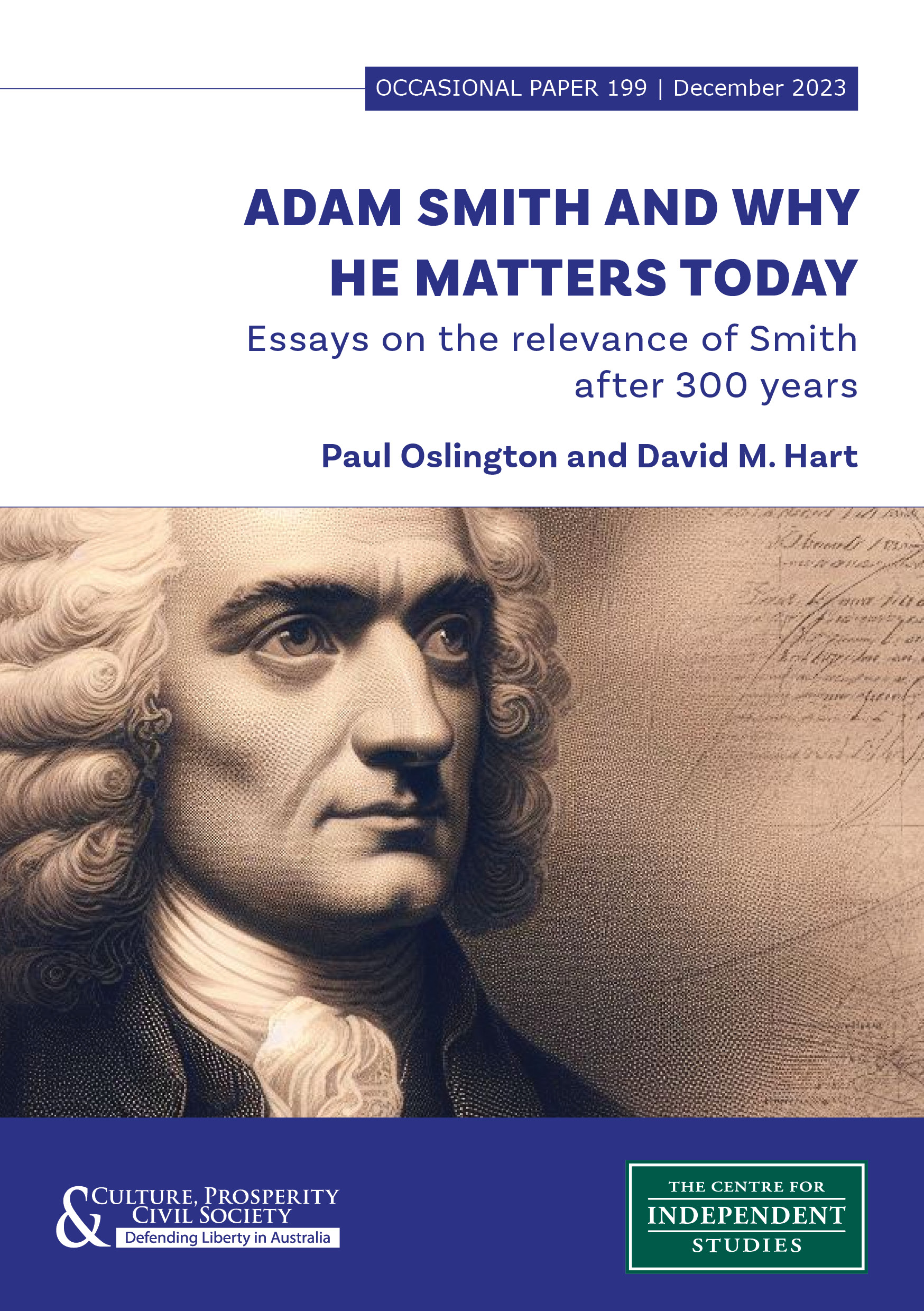
Adam Smith and Why He Matters Today:
Essays on the relevance of Smith after 300 years
Foreword
Adam Smith, the Scottish philosopher and economist, is one of the most significant figures to have emerged from what came to be known as ‘the Scottish Enlightenment’. His work across a number of disciplines changed the way people thought about economic theory and the field of what is now known as ‘political science’.
Smith was superbly educated in moral philosophy, ancient philosophy, jurisprudence and natural theology — at a time when science and religion were regarded as complementary rather than antagonistic.
In developing a moral philosophy that informed a deeper understanding of human interaction, Smith laid the foundation for a thorough exposition of the human practices of commerce and government. By encouraging use of our capacity for imagination, Smith argued that every member of a civil society needed to put themselves in the shoes of others and to see matters as others see them. For Smith, imagination — and the fostering of sympathy — was the key to our ability to engage in social and commercial exchange.
Adam Smith is one of the intellectual pillars of the Centre for Independent Studies. Informed by the breadth of Smith’s vision, the CIS has always been committed to investigating the nature of society and has argued that the exercise of civic responsibility by individual citizens is every bit as important to the health of society as the policies delivered by government.
This year marks the 300th anniversary of Smith’s birth, but his ideas and critical insights retain their importance today for contemporary Australia. In this Occasional Paper, Professor Paul Oslington and Dr David Hart, two distinguished Australian scholars, reflect both on the work of Smith and on the lessons he can teach us today.
Paul Oslington introduces Adam Smith and sets his work in the context of the intellectual world in which Smith formulated his ideas; he then looks at the thorny issue of rent seeking in modern Australia through the prism of Smith’s thought. At time when many are disillusioned with the processes of government, David Hart’s evaluation of Smith’s thought concerning the business of politics is especially timely.
I am delighted that Professor Oslington and Dr Hart have contributed these essays to mark the anniversary. In doing so, they allow the CIS to honour the vast intellectual contribution that Smith continues to make to the very fabric of contemporary Western society.
Peter Kurti, Director – Culture, Prosperity & Civil Society program
Adam Smith in the Scottish Enlightenment and Beyond
PAUL OSLINGTON
Professor of Economics and Theology, Alphacrucis University College, Sydney. Honorary Professor, Centre for Religion Ethics and Society, Charles Sturt University, Canberra.
This year there have been events across the world celebrating the 300th anniversary of Adam Smith’s birth. Many of these have been part of a program based at the University of Glasgow and funded by the John Templeton Foundation, including events at universities in Perth and Sydney, where leading Smith scholars have reflected on the significance of Adam Smith for today’s issues.
It is entirely appropriate that the Centre for Independent Studies, with its tradition of offering intellectually well-grounded public policy alternatives, marks the relevance of Adam Smith today with this paper. The intellectual grounding of these alternatives has often been Adam Smith and Hayek, evidenced by the many events CIS has run exploring their works and what we can learn from them in our contemporary Australian context. It is a great pleasure to be involved in this publication continuing this proud tradition of reflection on Smith’s work.
Who was Adam Smith?
Adam Smith was born in 1723 in Kirkcaldy Scotland, brought up by his mother Margaret after his father died two months prior to his birth[1]. The Glasgow connection begins with his studies at the city’s university from 1737-40, leading to a Snell scholarship which allowed him to spend the years 1740-46 at Balliol College Oxford. His correspondence and comments on Oxford in the Wealth of Nations indicates how unimpressed he was with the place compared to Scottish universities. One bright spot in his Oxford years was reading David Hume’s newly published Treatise of Human Nature, although Smith was busted reading this proscribed work in his college rooms. Hume was later to become his closest friend.
The Snell scholarship entailed a commitment to ordination in the Church of England, but Smith, like many of the Snell scholars, pursued other interests. For him, this was lecturing on rhetoric and belles lettres in Edinburgh (see Smith 1983). Some fascinating works[2] from this period include his account of the origins of language which compare linguistic exchange to market exchange, and his essay on the history of astronomy, where Issac Newton’s methods are described and admired. Newton was a key figure in the British tradition of scientific natural theology, shaping Smith’s approach.
Smith became a key figure in the Scottish Enlightenment. Unlike much of the French Enlightenment, Scotland’s was decidedly religious, although its moderate Calvinism contrasted with the rigidity of the orthodox party within the Church of Scotland[3]. With the pervasive influence of the Kirk on Smith’s Scotland, this Calvinist influence on his thought is important[4], alongside the influences of his beloved teacher Francis Hutcheson, the natural law philosophy of Grotius and Pufendorf[5], and Smith’s youthful interest in Stoic philosophy[6]. Hume was an important dialogue partner and influence, but Smith’s views on many matters differed from those of his friend.
Smith succeeded Hutcheson as Professor of Moral Philosophy at the University of Glasgow in 1751. His lectures began with natural theology, then proceeded to cover a range of topics much broader than one would encounter in a contemporary university course on moral philosophy. We are fortunate to have some student lecture notes from this period (published as Smith 1978), and these Glasgow lectures were the foundation of his Theory of Moral Sentiments (published in 1759 and revised constantly until the final 1790 edition), his Wealth of Nations (1776, again with many subsequent editions), and perhaps the never-published “great work on the anvil” (Ross 2004).
Between the publication of these two works, Smith toured Europe as tutor to the young Duke of Buccleuch, allowing him to meet French philosophers and economists. On his return, the pension from the duke allowed him to retire to Kirkaldy, though there were frequent trips to London as he completed the Wealth of Nations.
A twist which some commentators find strange is Smith’s appointment as Commissioner of Customs in 1778, becoming the Scottish face of taxation of international trade. The same commentators are often even more puzzled by Smith’s support of usury laws, of navigation acts which restricted trade to British shipping, along with other flagrant violations of contemporary free-market orthodoxy.
A curious episode from this late part of his life was unwillingness to publish David Hume’s Dialogues on Natural Religion, even though he was his friend’s literary executor. But any sense that Smith withdrew from this commitment to avoid public embarrassment is dispelled by his adding a description of Hume’s death to his friends’ autobiography, concluding “I have always considered him, both in his lifetime and since his death, as approaching as nearly to the idea of a perfectly wise and virtuous man, as perhaps the nature human frailty will permit.” (Smith 1978 178). Later he observed “A single, and as, I thought a very harmless sheet of paper, which I happened to write concerning the death of our late friend Mr Hume, has brought upon me ten times more abuse than the very violent attack I had made upon the whole commercial system of Great Britain”. (Smith 1978 208).
Smith died in Edinburgh in 1790, having observed the French and American revolutions, as well as the less momentous departure of the first fleet for Australia. His devout mother who had lived with much of his life died just a few years before him. Sadly, almost all of Smith’s papers were burnt on his instructions shortly before he died.
The Reception of Smith’s Works
The work that most Centre for Independent Studies members will focus on is the Wealth of Nations[7], but it is important to recognise that Smith’s works constitute what one of Smith’s prominent interpreters has called “a system of social science” (Skinner 1996). The Theory of Moral Sentiments provides a moral psychology and individual-level moral philosophy, while the Wealth of Nations operates at the level of the economic system. Some older commentators struggled with the supposed ‘Adam Smith Problem’ of a contradiction between the prominence of sympathy in the Theory of Moral Sentiments and self-interest in the Wealth of Nations, but it is now generally recognised that those commentators misunderstood the role of sympathy in Smith’s moral psychology and misread Smith as a proponent of selfishness.
It is interesting to review the range of interpretations of Smith’s works in different times and places. The ‘Adam Smith Problem’ arose among 19th century German interpreters for whom Smith a became a symbol of misguided English laissez-faire policy. I will concentrate here on Smith’s reception in the English-speaking world, despite the fascinating and illuminating work that has been done on the way his works have been read in places like Russia, Japan and China[8]. Some readers may be interested to know that Smith has the distinction of having his work listed on the Catholic Church’s index of prohibited books. But it was, in fact, Sophie de Condorcet’s 1798 French translation of the Theory of Moral Sentiments, that seems to have disturbed the censors — as much for the translator’s association with the French Revolution (on top of Smith’s own suspected revolutionary links) — as for its content.
Interpretations of Smith’s works include:
1) Adam Smith the father of modern economics. Despite the lamentable disregard of the history of economics in the contemporary economics profession, Smith is still honoured as its founder and invoked regularly in presidential addresses and assessments of the state of the discipline. This is regardless of whether the speaker or writer has even opened one of Smith’s works, or considered how many ideas in the Wealth of Nations were present in other 18th-century European texts, or considered how much later anything remotely similar to the contemporary discipline of economics took shape in Britain (Winch 1971, Tribe 2020 2021).
A variant of this is the invocation of Smith in support of all sorts of contemporary theoretical, empirical and policy arguments.
Most striking, but in my view lacking textual support, is the argument that the Smithian invisible hand translates individual self-interested action into good outcomes for society.
2) Adam Smith as the advocate of free markets and small government. This Smith was the construction of an influential group of British and American economists, especially Chicago economists such as Milton Friedman and George Stigler (for example, Stigler 1976). This Smith was deployed most powerfully in the Thatcher and Reagan years of the 1970s and 80s to support a program of deregulation and privatisation. Smith was invoked in support of similar policies in Australia. Whether or not these were good policies, and my view is that they mostly were good policies, they are a long way from anything Smith advocated in his 18th-century Scottish context. Donald Winch’s work (1978) was an early pushback against the Chicago interpretation of Smith, and Glory Liu (2022) a recent and comprehensive account of the way Smith became an icon of American capitalism. In
terms of Smith’s pragmatism in support of usury laws, see Oslington 2023.
3) Adam Smith as the founder of Marxian sociology. This Smith was a reaction to the similarly distorted Smiths just described. Its advocate Ronald Meek (1967) highlighted the stage theory of history and the emphasis on economic mechanisms that were shared by Smith and Marx.
4) Adam Smith the moral philosopher. This Smith was a reaction to the perceived capture of Smith by economists for whom he was just the writer of the Wealth of Nations. Moral philosophers such as DD Raphael (2007) restored the Theory of Moral Sentiments to its rightful place in Smith’s system and emphasised the originality and power of his moral philosophy.
5) Adam Smith the political theorist. This has been a recent development in Smith scholarship, represented by Lisa Hill (2019) and Paul Sagar (2022, 2023).
6) The ‘new view of Adam Smith. This Smith grew out of the push by intellectual historians to read Smith’s works in their 18th century Scottish context, especially to restore the religious context which had dropped out of sight of contemporary scholars for whom religion was neither important nor well understood. I have reviewed the debates over the new view (Oslington 2019), and CIS ran a debate some years ago on this (Oslington and Kennedy2010).
Of course, all interpretations of Smith’s works reflect the particular context and interests of the interpreter. But some interpretations are just too foreign to the Smith of 18th century Scotland and resisted by the texts.
Adam Smith on the ‘Great System of Government’ and its Political Machine
DAVID M. HART
Adjunct Research Fellow with the UWA Business School
Adam Smith’s political theory is less well explored by scholars than his moral theory in Theory of Moral Sentiments (TMS) (Smith 1759), his economic theory in The Wealth of Nations (WN) (Smith 1776), or his history and theory of jurisprudence in Lectures on Jurisprudence (LJ) (Smith 1978). In this essay I examine an important component of Smith’s political theory (building on Hart 2023a, 2023b, 2023c), namely his notion of the “Great System of Government” and “the political machine” which operates it. Smith developed key points of his theory in TMS but in my view the more political aspect of this book has not been adequately recognised by his readers, except for a few, such as Lisa Hill (Hill 2019) and Paul Sagar (Sagar 2022).
Government, according to Smith, was one of the ‘systems’ which made up the much larger “great system of the universe” (TMS VI.ii.3.6). Within this there were two other systems or sub-systems which Smith discussed in his work, the better known “system of natural liberty” (WN IV.ix.51) and the lesser known “great system of government” (TMS IV.i.11).[11] These two systems to some extent overlapped but at other times came into conflict with each other.
Of course, it was clear to Smith and other liberals of his day that the great system of government often manipulated or perverted the system of natural liberty to benefit some individuals or groups at the expense of others. The best examples of this in Smith’s own day were what he called the “mercantile system” of trade protection and restraint and the “slave system”, whereby the state permitted and protected the ownership of some human beings by others and their forced labour for another person’s gain. In both cases these “systems of preference and restraint” (WN IV.ix.51) grossly violated the natural rights of others.
The people who benefited from the existing systems of preference and restraint (such as merchants, manufacturers, and slave owners) came from two different groups, according to Smith — those who were “unproductive hands” and those who were “rapacious men”. These two groups needed the power of the state to secure benefits (such as income, resources, and the exercise of power over others), which they would not otherwise be able to obtain by means of their own productive work and voluntary market exchanges with buyers. The “unproductive hands” (WN II.iii.30) were those who were part of the “ecclesiastical establishment” (the established churches such as the Church of England and the Roman Catholic Church elsewhere in Europe), the “great court” (those friends, relatives, and employees of the monarch), the senior officers of the army and navy, and other senior government officials in the ministries and law courts. These groups and their incomes and other benefits were explicitly mentioned in the Civil List (LJ(A) iv.174).
By “rapacious men” (WN IViii.c.9) Smith has in mind those well-connected and legally privileged merchants and manufacturers who benefited enormously from the “mercantile system”, and the slave-owners and slave-traders who benefited from the “slave system”. As he forcefully stated in WN about the rapacity of men:
Commerce, which ought naturally to be, among nations, as among individuals, a bond of union and friendship, has become the most fertile source of discord and animosity. The capricious ambition of kings and ministers has not, during the present and the preceding century, been more fatal to the repose of Europe, than the impertinent jealousy of merchants and manufacturers. The violence and injustice of the rulers of mankind is an ancient evil, for which, I am afraid, the nature of human affairs can scarce admit of a remedy. But the mean rapacity, the monopolizing spirit of merchants and manufacturers, who neither are, nor ought to be the rulers of mankind, though it cannot perhaps be corrected, may very easily be prevented from disturbing the tranquillity of any body but themselves.
Smith hinted at the possibility of other “systems of preference and restraint” in addition to those of mercantilism and slavery. His famous quote about “the man of system” (TMS VI.ii.2.17) could be applied to other areas in which the state might intervene in an organised and systematic way to benefit some at the expense of the many.
The man of system, on the contrary, is apt to be very wise in his own conceit; and is often so enamoured with the supposed beauty of his own ideal plan of government, that he cannot suffer the smallest deviation from any part of it. He goes on to establish it completely and in all its parts, without any regard either to the great interests, or to the strong prejudices which may oppose it. He seems to imagine that he can arrange the different members of a great society with as much ease as the hand arranges the different pieces upon a chess-board. He does not consider that the pieces upon the chess-board have no other principle of motion besides that which the hand impresses upon them; but that, in the great chess-board of human society, every single piece has a principle of motion of its own, altogether different from that which the legislature might chuse to impress upon it. If those two principles coincide and act in the same direction, the game of human society will go on easily and harmoniously, and is very likely to be happy and successful. If they are opposite or different, the game will go on miserably, and the society must be at all times in the highest degree of disorder.
All systems of political power in Smith’s view attracted a certain kind of ruthless and ambitious men who either sought political power in their own right (through intrigue, civil war, or conquest), or sought to influence those already in power (as advisors to the Prince) to adopt new ways of organising society for political, economic, religious, or ideological purposes. Smith hinted that there were at least two other kinds of “men of system”, namely religious fanatics like Savonarola who wanted to use the power of the state to promote their own views and to punish, ban, or silence others who had different views; and those like Rousseau and his followers who wanted to use the state to restrict free markets and the industrial system to return to a more primitive natural order where there would be greater material equality and less corruption.
Of course, Smith could never have anticipated the new and dangerous “men (and women) of system” who would emerge in the 20th and 21st centuries. I have in mind communists, fascists, radical environmentalists, and the lockdown dictators of the Covid era.
In the TMS, Smith explores in some detail the actual mechanics of how the great system of government operated, based upon historical examples taken from the Roman period as well as the operation of the mercantilist and slavery systems of his own day. The core of the great system of government was what he described as a “political machine” (TMS IV.i.11) which had “wheels and springs” which governed its behaviour.
The driving force behind this political machine was the power and influence which men of high “rank, order, and station” had, as well as the “habitual state of deference” (TMS I.iii.2.3) shown to them by members of the public. People, Smith thought, had a “fascination of greatness” (TMS VI.ii.1.20) and had a “natural disposition to respect” those of higher rank and authority (TMS I.iii.2.3). When these public “sentiments” were combined with the existence of many “ambitious” and “rapacious” men who had a “love of domination and authority” over others (LJ(A) iii.114), it was not surprising that oppressive and anti-liberal systems of government would emerge.
At the top of the system were Princes and Monarchs, and Statesmen who were often drawn from the nobility or other high-ranking orders within society. These men of high rank had legally defined and protected “powers, privileges, and immunities” (TMS VI.ii.2.7) which other people of lower rank did not have. Those at the top sought to keep or expand their “powers, privileges, and immunities”, while those at the bottom sought to get them if they did not have any, or to expand what few they might already have.
Every independent state is divided into many different orders and societies, each of which has its own particular powers, privileges, and immunities. Every individual is naturally more attached to his own particular order or society, than to any other. His own interest, his own vanity, the interest and vanity of many of his friends and companions, are commonly a good deal connected with it. He is ambitious to extend its privileges and immunities. He is zealous to defend them against the encroachments of every other order or society.
This jostling for power took place within the context of a complex set of “wheels and springs” within the political machine (TMS IV.i.11). These consisted of parties, factions, cabals and conspiracies, and the machine’s smooth functioning was made possible by systemic corruption (Hill 2006).
Within the “political machine” groups organised themselves into “parties” and “factions” which competed against each other for control of the political machine according to what Smith thought were “laws of faction” (TMS III.3.43). “Parties” in Smith’s day were not as well organised or as ideologically driven as modern political parties (with the one exception being “ecclesiastical factions”). Members of a party or faction had interests which they pursued; they attempted to protect their interests and privileges from attempts by other parties or factions to take them away; there were “party men” who made a profession of working for their party; there were “men of ambition” who wanted to enter the political realm and to rise to the top; there were “political speculators” (TMS VI.ii.2.18) who looked for opportunities to expand the party’s power into new directions or to make alliances with “factions” within other parties in order to achieve their goals; members of a party or faction were often “fanatics” and “zealots” (TMS III.3.43) who were prepared to use “violence” (TMS III.3.43) either metaphorically (as in “violent” arguments and aggressive and uncompromising behaviour in meetings) or literally (as in actually using the coercive powers of the state to subdue or ban rivals). The winner in this battle for power was what Smith called the “prevailing” or “conquering party” (WN V.i.g.7).
Parallel to the parties and factions within the political machine there were more private and less formal associations of individuals who met to plan their activities and pursue their interests. Smith called them “cabals” and “conspiracies against the public” (WN I.x.c.27). Smith’s classic statement of the propensity of the rich and powerful to conspire against the public for personal gain is in the WN. It should be noted that he refers to “people of the same trade” which might be extended to include the “trade” of politics:
People of the same trade seldom meet together, even for merriment and diversion, but the conversation ends in a conspiracy against the publick, or in some contrivance to raise prices. It is impossible indeed to prevent such meetings, by any law which either could be executed, or would be consistent with liberty and justice. But though the law cannot hinder people of the same trade from sometimes assembling together, it ought to do nothing to facilitate such assemblies; much less to render them necessary.
The examples of “conspiracies” which Smith discussed were the merchants and manufacturers who benefited from the “mercantile system”; the slave owners and slave traders who comprised the “slave system”; and the “country gentlemen and farmers” (WN IV.ii.21) who began organising to further their agricultural interests somewhat later than the merchants and slave owners had done.
The benefits to those at the top of the political machine were usually clearly visible to all. They had the power to initiate legislation to favour their group or party; they got paid salaries or other money the details of which were published in the Civil List; they were granted official honors or promotions, and so on. However, Smith was concerned that the system of power and privilege also resulted in less visible benefits to those with power. These took the form of special favours, preferments, sinecures, and grants which might take place ‘under the table’ as it were. He was especially concerned with the problem of the bribery of judges, given the lengthy delays in getting a court hearing, the considerable costs involved in doing so, and the uncertainty of the outcome and the bias of the judge involved in hearing the case. He has an interesting argument about the benefits to be had by removing the payment of judges out of the political realm and into that of set fees payable by the litigants — a “fee for service” as it were (WN V.i.b.20).
Another form which corruption took was unintended and not so visible. For example, laws which restricted or banned the importation and sale of goods in high demand inevitably led to smuggling, the bribing of customs officials, as well as the hero-isation of those engaged in these illegal, but to the general public not immoral, activities. The smuggler, in Smith’s view, did not violate the “laws of natural justice” as it was the state which made smuggling “a crime which nature never meant to be so” (WN V.ii.k.64).
Smith also believed that the complexity and obscurity of the positive laws created an opportunity for the natural law (i.e., the protection of individual rights to life, liberty, and property) to be subverted to serve the interests of favored groups and individuals. Loopholes could be found, legal fictions invented, and other laws simply not enforced in an arbitrary manner. This caused what Smith called the “warping” of the system of positive laws by “particular orders of men who tyrannize the government” (TMS VII.iv.36) which he thought had a general corrupting influence on jurisprudence and the respect for the law among the public.
Let me conclude by saying that, although Adam Smith provided a rich and often clear-headed analysis of the true nature of political power and privilege, he did not pursue his analysis far enough or tie together all the rather loose threads he scattered throughout his major writings.
One glaring omission is the lack of any discussion of how politicians and senior bureaucrats who engaged in “the trade” of politics might also get together to “conspire against the public” to increase their own “power, privileges, and immunities”. He is rightly cynical of the colluding behaviour of merchants, slave-owners, and country gentlemen, but much less so regarding politicians and bureaucrats. This is where a more modern public choice analysis might be used to extend Smith’s theory of politics and thus make it more applicable to the current era (Rowley 2004 and Lee 2013). This I believe would be a fitting way to celebrate Adam Smith’s 300 anniversary and thereby to demonstrate another reason for his enduring relevance to those who still value individual liberty today.
Adam Smith and Rent Seeking in Contemporary Australia
PAUL OSLINGTON
What would Adam Smith be most disturbed by in contemporary Australia? Would he decry our remaining import tariffs? Would he be concerned about the number and complexity of trade agreements Australia has signed, and wonder whether they really represent free trade? The prevalence of monopolies? A strong case could be made for concern about the state of the education system, both schools and universities, given the emphasis in the Wealth of Nations on education for economic outcomes and the stability of a society. My guess is that he would be most concerned about the effect of pervasive rent seeking on economic outcomes and its tendency to corrupt morality[1].
Non-economists might be confused by the language of ‘rents’ because we are talking about more than returns on land here. Early economists developed this terminology from land rents which were the clearest case of a return where nothing of value is added by the recipient. It was broadened to include things like excess profits earned by monopolists and returns on special privileges granted by governments. The contemporary analysis of rent seeking came much later (Tullock 1967, Krueger 1974, Bhagwati 1982) and covered any expenditure of resources to capture rents in this general sense. This included such acts as lobbying the government to restrict imports of a product and allocate import quotas to the lobbyist. Such activity drives up the price of the product and delivers rents to those who obtained quota, and all domestic producers benefit from higher product prices. Other examples are rents from the government granting an exclusive licence to a firm to produce a product, or introducing regulations that make it difficult for new entrants to challenge an existing monopolist.
David Hart’s chapter has outlined some of Smith’s general concerns about government, and I would like here to focus on what Smith has to say about rents and rent seeking behaviour[2].
Smith was well aware of the problems of monopoly and cartels, writing in the Wealth of Nations that: “People of the same trade seldom meet together, even for merriment and diversion, but the conversation ends in a conspiracy against the publick, or in some contrivance to raise prices.” (WN Book I x c 27 p145).
Smith expanded a few pages later on the divergence of interests of producers and the general public:
“The interest of the dealers, however, in any particular branch of trade or manufactures, is always in some respects different from, and even opposite to, that of the publick. To widen the market and to narrow the competition, is always the interest of the dealers. To widen the market may frequently be agreeable enough to the interest of the publick; but to narrow the competition must always be against it, and can serve only to enable the dealers, by raising their profits above what they naturally would be, to levy, for their own benefit, an absurd tax upon the rest of their fellow-citizens. The proposal of any new law or regulation of commerce which comes from this order, ought always to be listened to with great precaution, and ought never to be adopted till after having been long and carefully examined, not only with the most scrupulous, but with the most suspicious attention. It comes from an order of men, whose interest is never exactly the same with that of the publick, who have generally an interest to deceive and even to oppress the publick, and who accordingly have, upon many occasions, both deceived and oppressed it. (WN I xi 10 p267)
Later in the Wealth of Nations when discussing international trade and capital movements he points to the monopoly-like effects of trade restrictions which are similarly against the public interest:
… monopoly of the home-market frequently gives great encouragement to that particular species of industry which enjoys it, and frequently turns towards that employment a greater share of both the labour and stock of the society than would otherwise have gone to it, cannot be doubted. But whether it tends either to increase the general industry of the society, or to give it the most advantageous direction, is not, perhaps, altogether so evident (WN IV ii 2 p453).
Furthermore:
No regulation of commerce can increase the quantity of industry in any society beyond what its capital can maintain. It can only divert a part of it into a direction into which it might not otherwise have gone; and it is by no means certain that this artificial direction is likely to be more advantageous to the society than that into which it would have gone of its own accord. (WN IV ii 3 p453).
Such regulations are the product of “that insidious and crafty animal, vulgarly called a statesman or politician (WN IV ii 39 p468)[3]
These and other passages indicate Smith’s awareness of something like the modern concepts of rents and rent seeking. A toxic combination of producers and government generates these, which absorb resources, divert other resources from more productive uses, and sap enterprise, innovation and productivity.
Such effects are discussed further in the contemporary literature. Baumol (1990) argues that the allocation of scarce entrepreneurship between productive uses and unproductive or even predatory uses is extremely important to long-term economic outcomes. Olson (1982) argues that the formation of coalitions of rent seekers explains the decline of many previously healthy economies. Banks (2013) identifies worrying signs that Australia is going down this path.
What data do we have on the extent of economic rents and rent seeking behaviour in Australia? Unfortunately, not much[4]. Murray and Frijters (2022), building on Murray (2012), consider how much wealth generated in Australia in recent times has come from pursuits like mining, property development, banking, and media which depend on monetising privileges or resources granted by government — for which their terminology is “grey gifts”. Murray and Frijters describe the games played by the hypothetical rent seeker James and his mates at the expense of the ordinary citizen Sam across different areas: taxes, property, superannuation, mining, pharmaceuticals, education, banking and transportation. Then towards the end of the book in a chapter entitled “How much does the game bleed you?” they compare Sam’s actual income and costs in James’ Australia with income and costs under world’s best practice in the different areas, concluding that Sam’s wealth is around half what it would be without James and his mates.
This estimate is under the perhaps extreme assumption that Sam has no part in any of the rent seeking games, but realistically Sam will be part of some of them — in other words Sam is a James in some areas at least. Murray and Frijters do not estimate the effect of rent seeking on Australia’s national income, which includes both Sam’s loses and James’ gains. It seems clear, though, that the net effect on national income is hugely negative, and that rent seeking worsens inequality.
So far, we have been considering the direct economic costs of rent seeking behaviour, but Smith has other concerns. The first of these is the offence against justice of rent seeking. He sees justice as a foundation of prosperity, writing that “society cannot subsist unless the laws of justice are tolerably observed” (TMS II ii 3 6 p87) and the “mean rapacity, the monopolizing spirit of merchants and manufacturers” (WN IV iii c 9 p493) is an offence against justice.
Smith’s second concern is that rent seeking is morally corrosive. In TMS I.iii p61-66, “Of the Corruption of our Moral Sentiments”, Smith paints a picture of two roads to the admiration of mankind which we all seek; one road to success by virtue and hard work and another road to success by abandoning virtue to grab at wealth.
Interestingly, Smith even in his book on moral psychology discusses in the manner of an economist how the incentives to pursue each of the roads depends on our station in life and the institutions of society. For those in middling stations and where institutional arrangements connect probable success to virtue, the first road would be chosen more often. This is almost a portrait of the choice between productive activity and rent seeking.
Smith in the final paragraph of this section describes with rhetorical flourish the moral decay of those who choose the second path: “they suffer the “avenging furies of shame and remorse; while glory seems to surround him on all sides” (TMS I.iii.8 p65). Later when Smith’s account of virtue is summarised in the figure of the “wise and virtuous man” (TMS VI ii 3 3 p235-36), this figure contrasts sharply and favourably with the successful but tortured rent seeker.
So, with Smith’s awareness of the economic damage done by rent seeking behaviour, as well as the erosion of justice and moral damage associated with rent seeking, my guess is that the extent of rents and rent seeking in contemporary Australia would concern Smith greatly.
References
Aspromourgos, Anthony (2009). The Science of Wealth: Adam Smith and the Framing of Political Economy London, Routledge.
Aspromourgos, Anthony (2020). “Invisible Hand” in New Palgrave Dictionary of Economics edited by M. Vernengo, E. P. Caldentey and B. J. Rosser. 3rd edition London, Palgrave Macmillan.
Aspromourgos, Anthony (2023 ). “Adam Smith at 300.” Lecture at University of Sydney https://vimeo.com/842070961
Australian Treasury (2023). Intergenerational Report 2023. Australia’s Future to 2063, https://treasury.gov.au/sites/default/files/2023-08/p2023-435150.pdf
Ballor, Jordan J. and Cornelius Van Der Kooi, Eds. (2022). Theology, Morality and Adam Smith. London, Routledge.
Banks, Gary (2013). “Return of the Rent-Seeking Society?” Economic Papers 32(4): 405-16.
Baumol, W. J. (1990). “Entrepreneurship: Productive, Unproductive and Destructive.” Journal of Political Economy 98(5): 893-921.
Berg, Chris (2017). “Adam Smith and Jeremy Bentham in the Australian Colonies.” History of Economics Review 68(1): 2-16.
Berry, Christopher (2018) Adam Smith Oxford, Oxford University Press.
Bhagwati, Jagdish (1982). “Directly Unproductive, Profit-Seeking (Dup) Activities.” Journal of Political Economy 90(5): 988-1002.
Broadie, Alexander and Craig Smith Eds, (2018). The Cambridge Companion to the Scottish Enlightenment 2nd edition. New York, Cambridge University Press.
Coleman, William O. (2023). “Adam Smith’s Case against the British Empire.” ANU Goldsmith Lecture 23 March https://rse.anu.edu.au/seminars-events/goldsmith-lectures.
Fergusson, David (2022). “Smith’s Theological Hinterland” in Theology, Morality and Adam Smith edited by Jordan Ballor and Cornelius Van Der Kooi. London, Routledge.
Fleischacker, Samuel (2021). Adam Smith New York, Routledge.
Graham, Gordon. (2015). “Natural Theology and Natural Religion in the Scottish Enlightenment.” Humanities: Christianity and Culture 46: 67-88. Lecture at Institute for the Study of Christianity and Culture, International Christian University, Japan.
Haakonssen, Knud (1981). The Science of a Legislator: The Natural Jurisprudence of David Hume and Adam Smith Cambridge, CUP.
Harrison, Peter. (2011). “Adam Smith and the History of the Invisible Hand.” Journal of the History of Ideas 72(1): 29-49.
Hart, David M. (2014). “Unfortunately, Hardly Anyone Listens to the Economists’ The Battle against Socialism by the French Economists in the 1840s.” CIS Lecture, Sydney.
Hart, David M. (2023a). “Putting the Political back into Adam Smith’s Political Economy: Smith on Power and Privilege, Faction and Fanaticism, and Corruption and Conspiracies” Paper presented at the History of Economic Thought Society of Australia annual conference, 20 Sept. 2023. http://davidmhart.com/liberty/Papers/Smith/Smith_ClassFactionCorruption2023.html.
Hart, David M. Ed (2023b). Adam Smith on Class and the State: An Anthology. Online at http://davidmhart.com/liberty/EnglishClassicalLiberals/Smith/Smith_ClassAnthology.html.
Hart, David M. (2023c). “Vocabulary Clusters in the Thought of Adam Smith: Smith’s Theory of Ranks, Class, and Government” Online http://davidmhart.com/liberty/Papers/Smith/VocabClusters-SmithOnClass.html.
Hill, Lisa (2019). Adam Smith’s Pragmatic Liberalism: The Science of Welfare Palgrave Macmillan.
Kennedy, Gavin (2011). “The Hidden Adam Smith and His Alleged Theology.” Journal of the History of Economic Thought 33(3): 385 – 402
Krueger, Anne O. (1974). “The Political Economy of the Rent Seeking Society.” American Economic Review 64(June): 291-303.
Lee, Dwight R. Ed. (2013). Public Choice, Past and Present: The Legacy of James M. Buchanan and Gordon Tullock. New York: Springer.
Liu, Glory M. (2022). Adam Smith’s America: How a Scottish Philosopher Became an Icon of American Capitalism Princeton, Princeton University Press.
Long, Brendan (2021). Adam Smith and the Invisible Hand of God London, Routledge.
Marshall, Paul (2023). Fighting the 3 Mutant Capitalisms. Alliance for Responsible Citizenship Conference Lecture, London., https://www.youtube.com/watch?v=G2DIEzdJLaA
Meek, Ronald L. (1967). “The Scottish Contribution to Marxist Sociology” in Economics and Ideology and Other Essays London, Chapman & Hall.
Mizuta, Hiroshi (2000). Adam Smith’s Library: A Catalogue Oxford, Oxford University Press.
Mizuta, Hiroshi and Chuhei Sugiyama, Eds. (1993). Adam Smith: International Perspectives. New York, St. Martin’s Press.
Murphy, Kevin M., Andrei Shleifer and Robert W. Vishny (1993). “Why Is Rent-Seeking So Costly to Growth?” American Economic Review Papers and Proceedings 83(2): 409-14.
Murray, Cameron K. (2012). “Markets in Political Influence: Rent-Seeking, Networks and Groups.” University of Queensland Working Paper
Murray, Cameron K. and Paul Frijters (2022). Rigged. How Networks of Powerful Mates Rip Off Everyday Australians Sydney, Allen and Unwin.
Olson, Mancur (1982). The Rise and Decline of Nations: Economic Growth, Stagflation, and Social Rigidities New Haven, Yale University Press.
Oslington, Paul Ed. (2011). Adam Smith as Theologian. London, Routledge.
Oslington, Paul (2012). “God and the Market: Adam Smith’s Invisible Hand.” Journal of Business Ethics 108(4): 429-38.
Oslington, Paul (2018). Political Economy as Natural Theology: Smith Malthus and Their Followers London, Routledge.
Oslington, Paul (2019). “The New View of Adam Smith in Context.” History of Economics Review 71(1): 118-31. Church
Oslington, Paul (2023). “Adam Smith on Usury: Pragmatism over Ideology.” National Review (16 August).
Oslington, Paul and Gavin Kennedy (2010). Reconciling God and Mammon: Adam Smith and How Religion Shaped His Ideas CIS Lecture https://vimeo.com/9395998.
Paganelli, Maria Pia (2020). The Routledge Guidebook to Smith’s Wealth of Nations New York, Routledge
Productivity Commission (2023). Productivity: The Key to Prosperity. Canberra, https://www.pc.gov.au/inquiries/current/productivity/interim1-key-to-prosperity#media-release.
Raphael, D. D. (1985). Adam Smith Oxford, Oxford University Press.
Raphael, D. D. (2007). The Impartial Spectator Oxford, Clarendon.
Ross, Ian Simpson (2010) The Life of Adam Smith 2nd edition. Oxford, Oxford University Press.
Ross, Ian Simpson (2004). “Great Works on the Anvil in 1785: Adam Smith’s Projected Corpus of Philosophy.” Adam Smith Review 1: 40-59.
Rowley, Charles K. and Friedrich Schneider Eds (2004). The Encyclopedia of Public Choice. New York: Kluwer Academic Publishers.
Sagar, Paul (2022). Adam Smith Reconsidered: History, Liberty and the Foundations of Modern Politics Princeton, PUP.
Sagar, Paul, Ed. (2023). Interpreting Adam Smith: Critical Essays, Cambridge, CUP.
Samuelson, Paul A. (1948). Economics New York, McGraw Hill.
Skinner, Andrew S. (1996). A System of Social Science: Papers Relating to Adam Smith Oxford, Clarendon Press.
Smith, Adam (1759/1790). The Theory of Moral Sentiments edited by D.D Raphael and A. Macfie. Oxford, Oxford University Press 1975. Abbreviated TMS
Smith, Adam (1776). An Inquiry into the Nature and Causes of the Wealth of Nations Edited by R.H. Campbell, A.S. Skinner and W.B. Todd. Oxford, Oxford University Press 1976. Abbreviated WN
Smith, Adam (1978). Lectures on Jurisprudence Edited by R.L. Meek, D.D. Raphael, .and P.G. Stein. Oxford, Oxford University Press.
Smith, Adam (1795). Essays on Philosophical Subjects Edited by W. P. D. Wightman, J. C Bryce and Ian Simpson Ross. Oxford, Oxford University Press 1980.
Smith, Adam (1983). Lectures on Rhetoric are Belles Lettres Edited by J.C. Bryce. Oxford, Oxford University Press.
Smith, Adam (1986). The Correspondence of Adam Smith. 2nd edition. Edited by E.C. Mossner and Ian Simpson Ross. Oxford, Oxford University Press.
Stewart, Dugald (1795) “Account of the Life and Writings of Adam Smith” in Essays on Philosophical Subjects edited by W. P. D. Wightman and J. C. Bryce. Oxford, Oxford University Press 1980. Based on papers read at the Royal Society of Edinburgh in 1793.
Stigler, G. J. (1976). “The Successes and Failures of Professor Smith.” Journal of Political Economy 84(6): 1199-213.
Tribe, Keith Ed (2002). A Critical Bibliography of Adam Smith. London, Pickering and Chatto.
Tribe, Keith (2022) “Framing the Wealth of Nations” History of Political Economy 54 (5): 951–973.
Tullock, Gordon (1967). “The Welfare Cost of Tariffs, Monopoly and Theft.” Western Economic Journal 5(June): 224-32.
Winch, Donald (1971). “The Emergence of Economics as a Science” in The Fontana Economic History of Europe edited by C. Cipolla. London, Fontana. 3: 507-73.
Winch, Donald (1978). Adam Smith’s Politics Cambridge, Cambridge University Press.
Winch, Donald (2004). “Adam Smith” in Oxford Dictionary of National Biography edited by L. Goldman. Oxford, Oxford University Press.
University of Glasgow (2023) Adam Smith 300 https://www.gla.ac.uk/explore/adamsmith300/
Vaggi, Gianni. and Peter D. Groenewegen (2014). A Concise History of Economic Thought Revised Edition. London, Palgrave Macmillan.
Viner, Jacob (1927). “Adam Smith and Laissez Faire” Journal of Political Economy 35(2): 198-232.
Viner, Jacob (1968). “Adam Smith” in International Encyclopedia of the Social Sciences edited by D. Sills. New York, Macmillan. Volume 14 322-29.
Endnotes
[1] Smith’s first biographer was Dugald Stewart (1795) but the best biography remains that of Ian Simpson-Ross (2010), who also edited Smith correspondence (Smith 1986). Jacob Viner (1968) and Donald Winch (2004) are shorter biographies by great historians of economics. Smith’s library has been reconstructed by Mizuta (2000). Literature on Smith is vast (see for instance Tribe 2002); shorter reliable works include Viner (1927), Raphael (1985), Skinner (1996), Aspromourgos (2009), Berry (2018), Tribe (2020) and Fleischacker (2021). Chris Berg (2017) gives a fascinating account of Smith’s impact on the Australia colonies, and William Coleman (2023) discusses Smith’s view of the British Empire. The Scottish enlightenment context as discussed in Broadie and Smith Eds, (2018). Readers seeking to orient Smith in the history of economics could consult Vaggi and Groenewegen (2014).
[2] Smith’s works are best read in the Glasgow edition published by Oxford University Press through the 1970s, now available from Liberty Fund as inexpensive paperbacks, with pdf facsimiles available for free on its website https://www.libertyfund.org/collections/the-glasgow-edition-of-the-works-of-adam-smith/.
[3] The Church of Scotland had since 1690 been the established church north of the border. It was a Presbyterian church that took as its standard of faith the Westminster Confession of 1647. Smith was a regular attender and publicly subscribed to the Westminster Confession when taking up his appointment at the University of Glasgow.
[4] I have discussed the religious background thought (Oslington 2011, 2018, 2019) and other perspectives are offered by Kennedy (2011), Graham (2015), Fergusson (2022), Ballor and Van Der Kooi (2022), and Long 2021).
[5] The Reformed natural law background is rightly emphasized by Haakonssen (1981).
[6] The idea that the extensive references to divine providence in Smith’s works reflect a commitment to Stoic philosophy came from Raphael and Macfie’s influential introduction to the Glasgow edition of TMS. It has been picked up by Lisa Hill and many others. However as discussed in Oslington (2011) Smith explicitly rejects Stoic philosophy and many elements of his works are inconsistent with it. My view is that Smith had moved away from his youthful enthusiasm for Stoic philosophy and that the references reflect Newtonian natural theology. Of course, these are not distinct and mutually exclusive entities – Christian and Stoic thought were intertwined in the early modern period.
[7] There are various readers guides to the Wealth of Nations, but a recent and helpful one is Paganelli (2020).
[8] The wider reception of Smith’s works is discussed by Mizuta and Sugiyama (1993), Tribe (2002) and others.
[9] The Smithian invisible hand is discussed by Aspromourgos (2020). Paul Samuelson’s influential 1948 textbook entrenched the self-interested agents generate efficient outcomes reading of the invisible hand. My interpretation is given in Oslington (2012), resting on Peter Harrison’s (2011) demonstration beyond any doubt that the hand is the providential hand of God.
[10] “Great” could mean large and powerful, or perhaps very important and good. I think the former meaning is the one Smith had in mind.
[11] After drafting this essay, it was interesting to observe the emphasis on monopolies and cronyism as dangers for the free economy and society in Paul Marshall’s (2023) keynote at the Alliance for Responsible Citizenship conference in London.
[12] A superficial reading of Smith’s distinction between productive and unproductive labour might equate unproductive labour with resources wasted in seeking rents. Smith’s discussion begins: Productive and Unproductive Labour “There is one sort of labour which adds to the value of the subject upon which it is bestowed: There is another which has no such effect. The former, as it produces a value, may be called productive; the latter, unproductive labour” “Their service, how honourable, how useful, or how necessary so ever, produces nothing for which an equal quantity of service can afterwards be procured” (WN II iii 1 p330). However, Smith is concerned here with the growth process rather than waste – a clue being Smith’s comment even in this brief passage that the unproductive labour is necessary. The issue is further discussed in Aspromourgos (2009).
[13] Between these passages is Smith’s famous reference to the invisible hand. If the invisible hand is Smith’s metaphor for the harmony of interests, then it is hard to reconcile with the surrounding passages quoted. I have argued elsewhere (Oslington 2012, 2018) that in the invisible hand passage Smith is playing with the idea of special providence keeping Scottish capital at home, in spite of the lure of greater returns overseas.
[14] The Productivity Commission has been at the forefront of the fight to restrain rent seeking in Australia, so one might expect an estimate of the extent of rents and rent seeking in its most recent report (Productivity Commission 2023). There are comments about the problem of rent seeking scattered throughout the nine volumes of the report, but no attempt to quantify this. Nor is any literature estimating the extent of the problem cited. Similarly unhelpful is the Treasury intergeneration report on Australia’s future economic prospects (Australian Treasury 2023). There is a need for both academic research and inquiries by bodies such as the Productivity Commission and Treasury to quantity rents and rent seeking activity in Australia, along with its impacts on economic outcomes.











